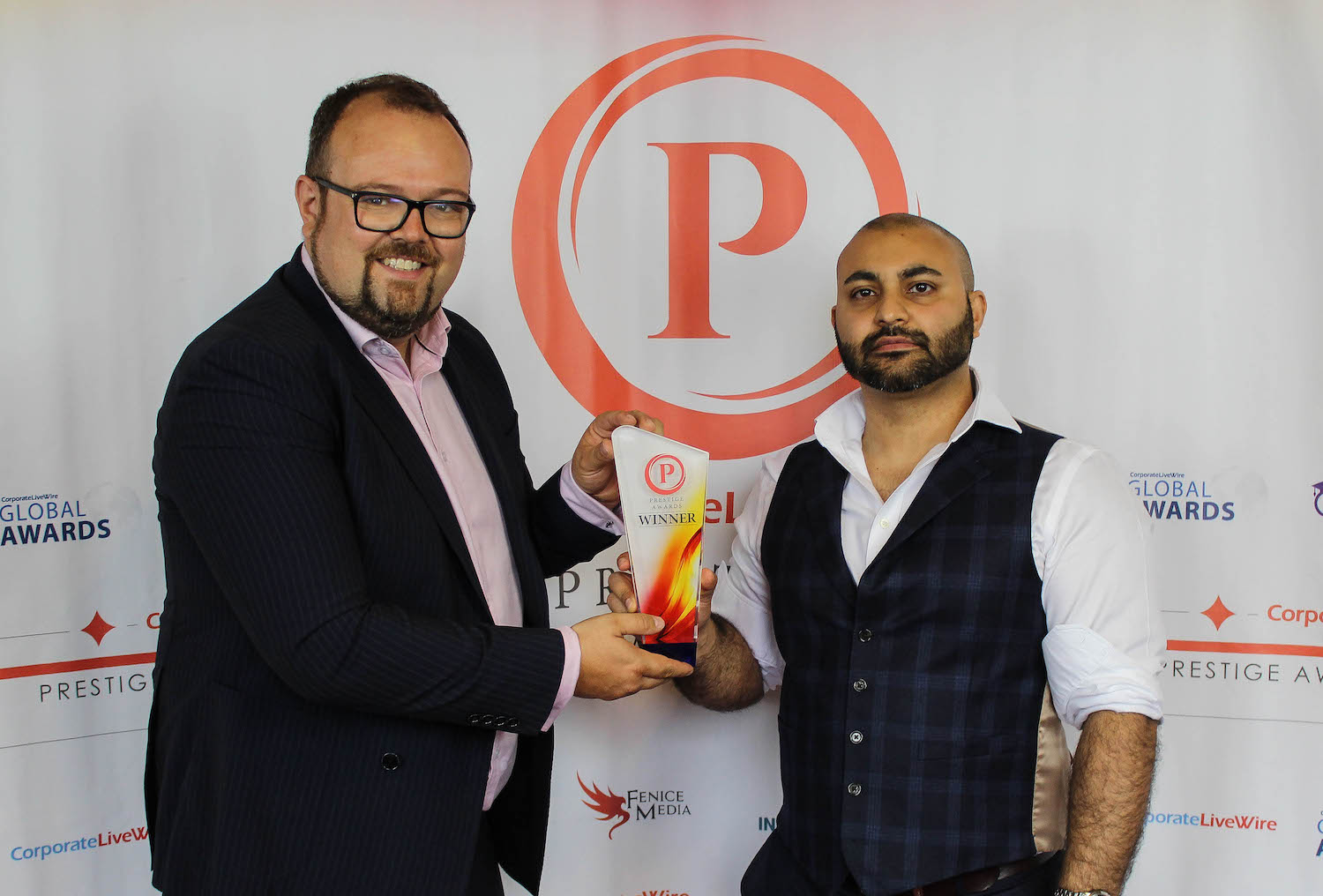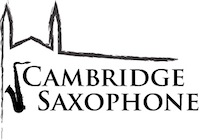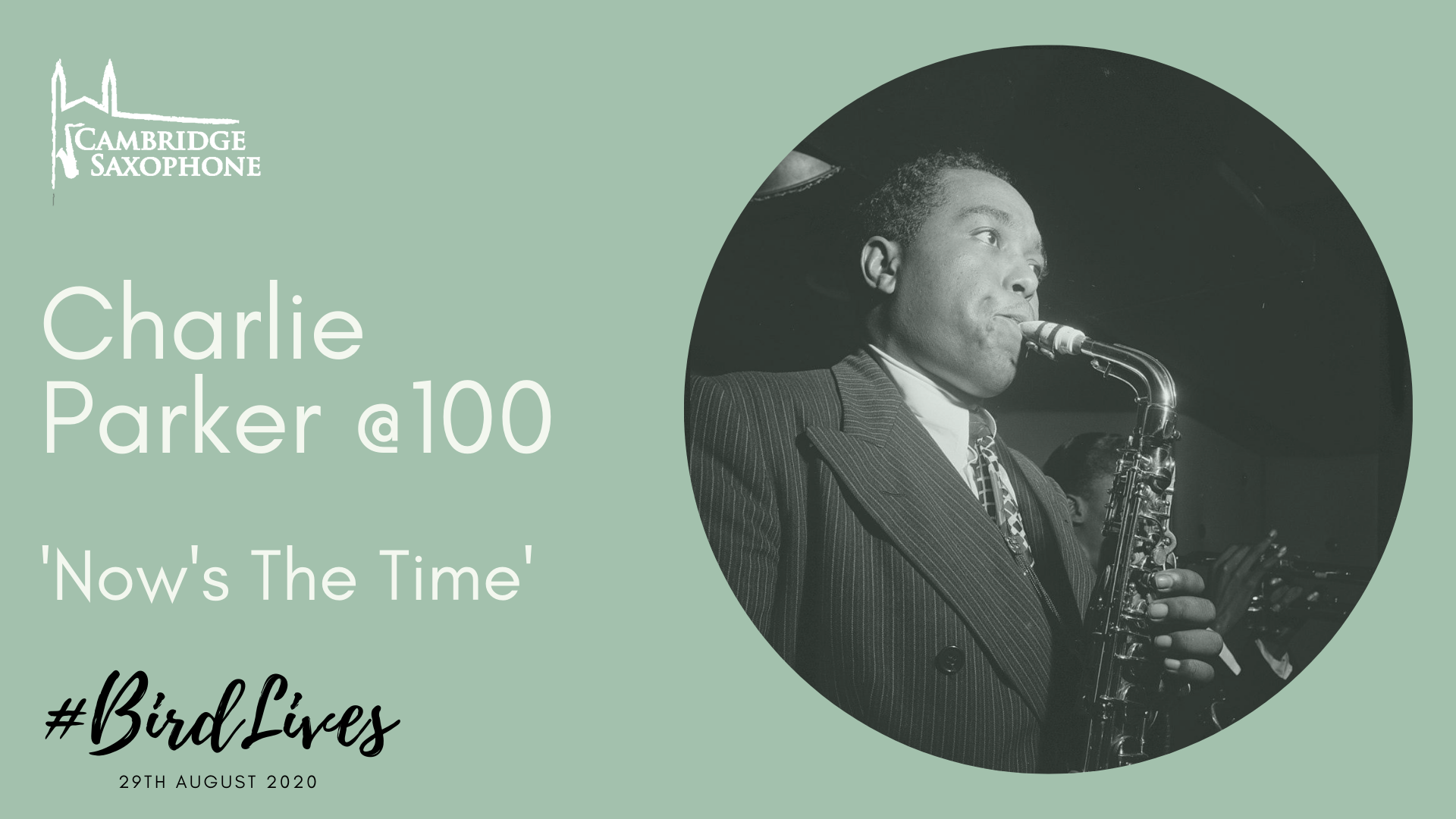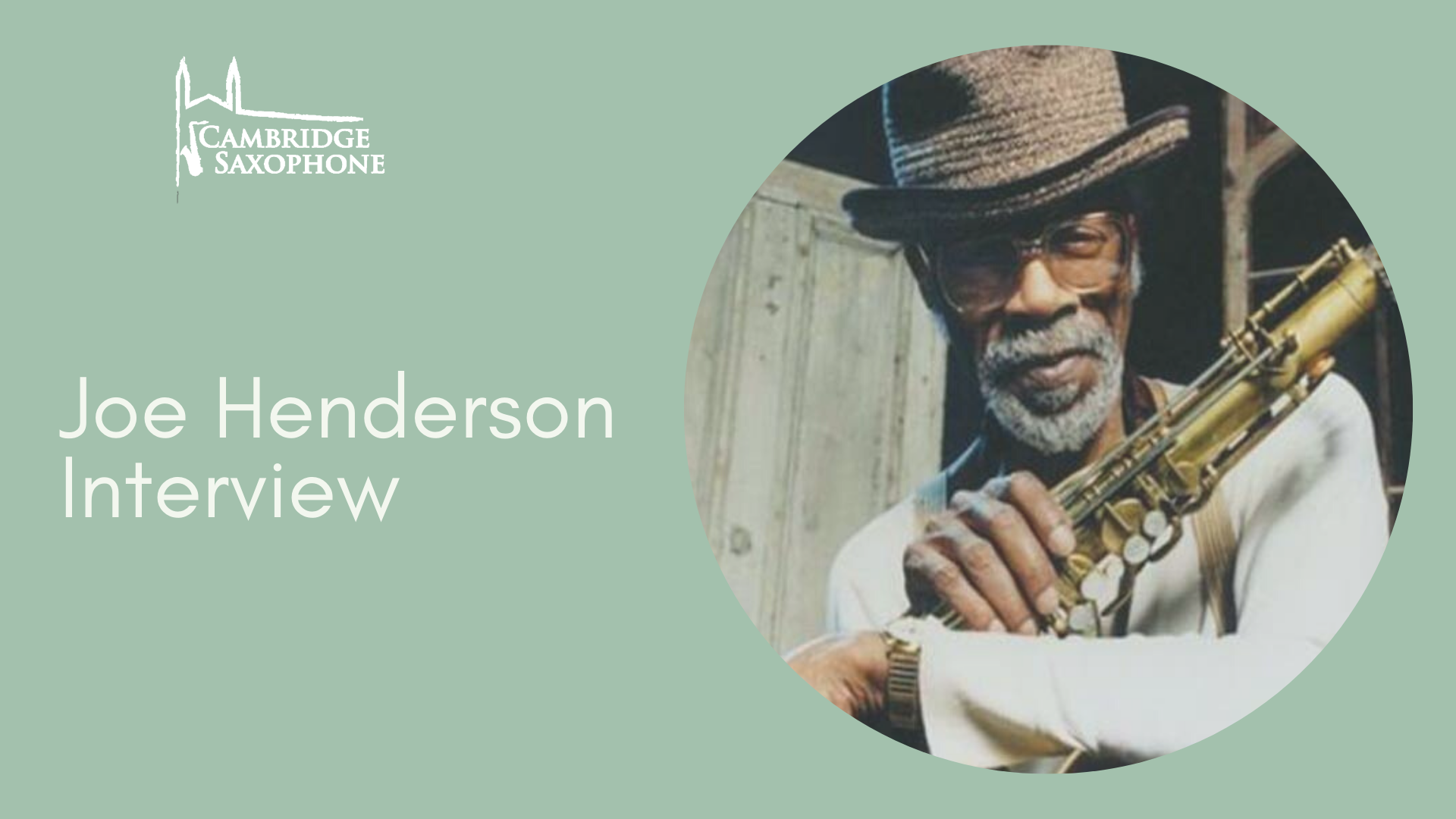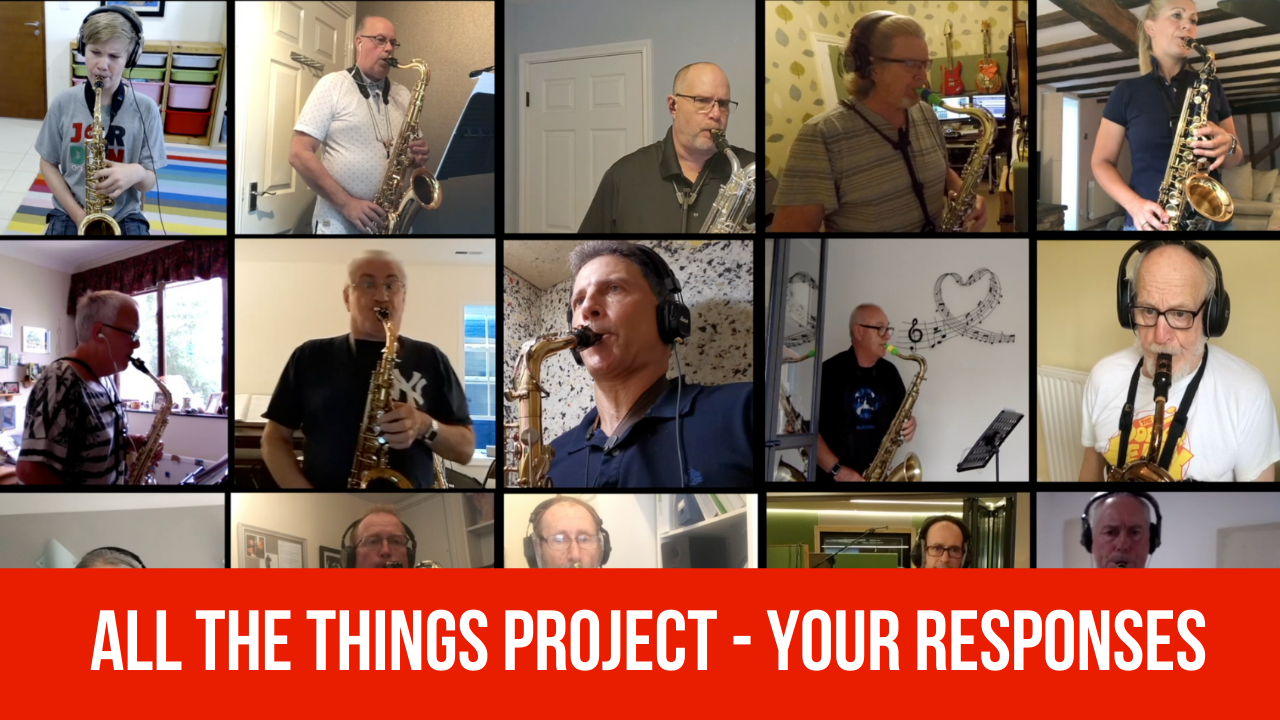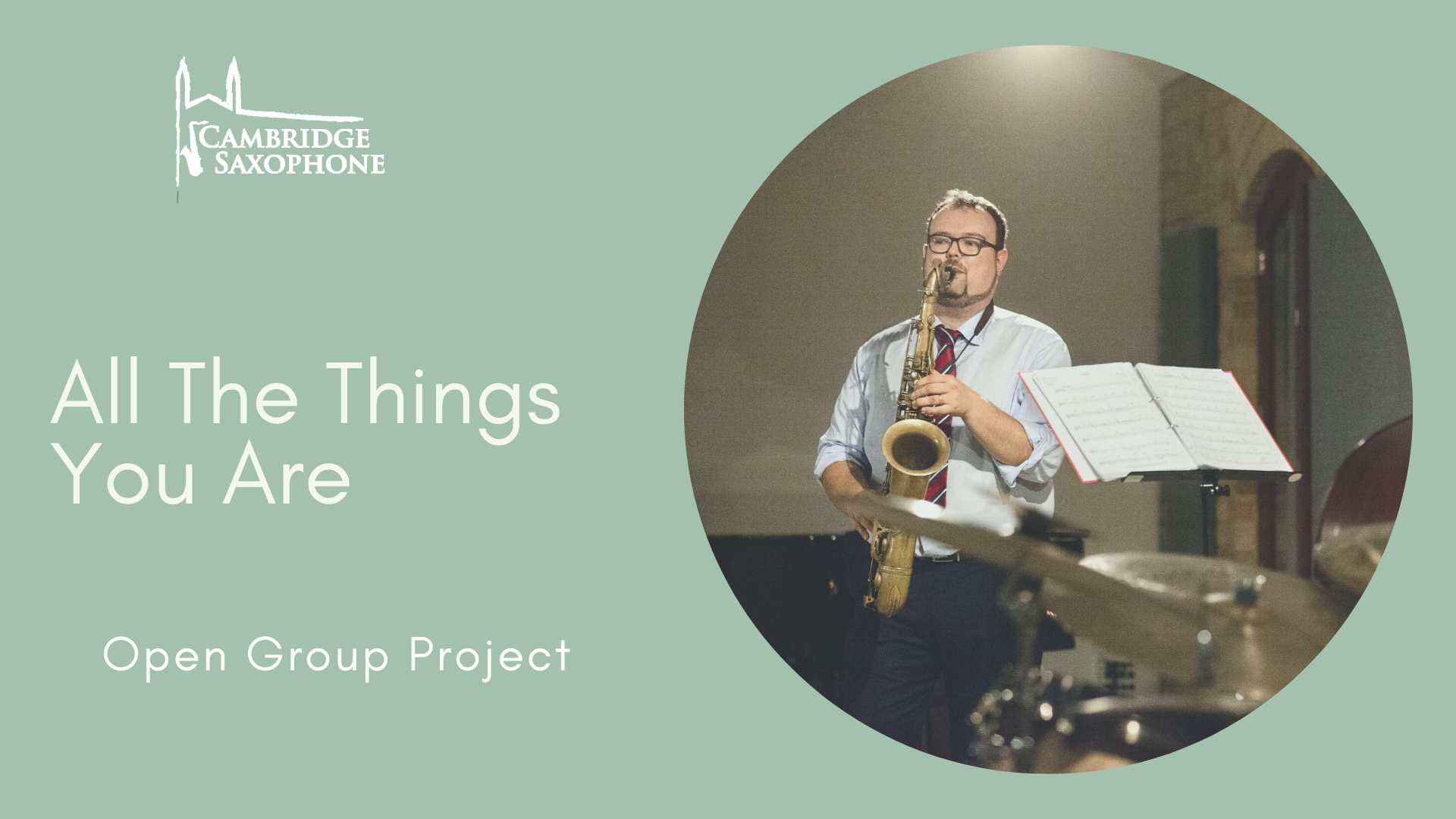I stumbled across an email from February 2012, (it’s July 2020 as I write this post) that contained an interview with legendary saxophonist Joe Henderson. I’ve no idea where it came from, so if anyone has an idea, do let me know so I can give the correct credits! There are a number of things that strike me in this interview;
- How important it is to be exposed to the music at a young age, Henderson says, ‘I remember one of my brothers, in particular, who is a scientist, had this Jazz At The Philharmonic collection. He was a jazz buff and it was very important and good for me to have been around that early on, because before I started to play the saxophone, I knew what the saxophone was a supposed to sound like.’
- The importance of Lester Young & transcribing, ‘I do remember taking some Lester Young solos off a record with the help of my brother. This was around age nine. Well, I wasn’t doing it myself, my brother was helping me, having the kind of mind he had. It used to amaze me later how he was able to do that at that time. We had those 78 rpm records, so he’d take the needle, set it down on the record, and say, “Joe, play these notes,” and he’d let about four or five notes go by, and I’d find them on the horn.‘
- Knowing Charlie Parker (Be-Bop Tunes) ‘We learned every Charlie Parker tune that was every written
As I said, I’d like to give credit when I can, but here is the full interview.
To me you’re one of the last of the great saxophone innovators. You have a style that many have tried to emulate, but there’s not been anybody as original as you in succeeding generations. These things don’t just fall out of the sky and hit people over the head, it comes from somewhere. I would be interested in knowing who your influences were. I know you’ve been playing like this since you were a youngster.
That’s very interesting. It’s difficult for me to blow my own horn (no pun intended). I got out of the military in August of 1962 and moved to New York in September or October. I started making records in the latter part of 1963. Prior to that I was born in a little town called Lima Ohio, which is about 125 miles from Detroit. I have nine brothers and five sisters, which is really a huge family. I remember one of my brothers, in particular, who is a scientist, had this Jazz At The Philharmonic collection. He was a jazz buff and it was very important and good for me to have been around that early on, because before I started to play the saxophone, I knew what the saxophone was a supposed to sound like. I heard a bunch of people like Lester Young, Illinois Jacquet, Coleman Hawkins, and Wardell Gray. Lester was probably the first influence that I could single out. There may have been others that are not clear, it’s hard to know where and when these influences start. But I do remember taking some Lester Young solos off a record with the help of my brother. This was around age nine. Well, I wasn’t doing it myself, my brother was helping me, having the kind of mind he had. It used to amaze me later how he was able to do that at that time. We had those 78 rpm records, so he’d take the needle, set it down on the record, and say, “Joe, play these notes,” and he’d let about four or five notes go by, and I’d find them on the horn. You know, the one that Prez called D.B. Blues, it became very famous later. So, I learned that and I tried to imitate that sound. Pretty soon I could keep this in my mind and my fingers could remember where they should be. I remember that as being the first solo I was able to take off a record.
So, Prez, as it turns out, was probably the first person that I was conscious of influencing me. I had been listening to Rhythm and Blues, and I had gone through that generation. I was always around Country and Western music as well. I know as much about Johnny Cash as I do about Charlie Parker, because I grew up in that area. This was all we heard on the radio. Sometimes I could dial in these far off stations, like in Chicago, where I would hear something just a little more musical. A little more similar to the records that my brother had in his collection, and I liked this. I knew that this was bebop, and I could differentiate that. I spent most of my time listening to bebop, and that was what I appreciated most, so this is what I gravitated toward when I started developing and getting a few things together about playing the saxophone. I was still quite innocent, it was like a toy at that point.
When I got a little older I would go out to these dances that they would have in my home town. When James Brown, B.B. King, Bo Diddley, Chuck Berry, and these cats would come to my hometown, I’d be there at those dances and I’d be checking out the saxophone players. They all had saxophones; two or three tenor players, a couple of baritones. And later James Moody would come to town with his bands. His stuff was a little more refined with his four horns. He’d have like a trumpet, trombone , baritone, and tenor or alto or flute. He played all the doubles. I can remember I saw ‘Trane at a couple of these dances. When I was about fourteen years old he came there with the Earl Bostic band. At that time Bostic was playing tunes like Flamingo, and a bunch of tunes that he made hit records of. I saw a lot of people who came to that town, who ten years later from that time, would be known as jazz personalities.
But, they spent their time paying their dues travelling around in this Rhythm and Blues circuit. I didn’t know that guy was John Coltrane, who I had seen and had talked to and met when I was about fourteen years old. I also saw Gene Ammons when I was about fifteen. He was the ‘Red Top” guy. You know this tune My Little Red Top? Yeah, that was classic stuff. Good music. So, my tastes became a little refined later on.
So, my information and my knowledge is growing because I’m starting to buy records and starting to hear people like Stan Getz, Herbie Steward, Stan Kenton, Woody Herman, and Duke Ellington. All this stuff was having more meaning. And all at the same time I was listening to Bartok, Stravinsky, and Hindemith because of my one sister’s tastes. I didn’t know who Stravinsky was, but I knew I liked the music that I heard.
Later I started meeting other musicians in town, who started showing me things. I’m learning tunes, my vocabulary is growing in terms of tunes that I had memorized, and I’m playing dances around town. So, I’m getting into it very innocently. If I made a couple of bucks playing a dance, that was big money for me. But the information that I was gathering at that time was the thing that served me well later. I was getting a chance to play the saxophone at a time when this was what I should be doing. Nobody had to tell me “Joe, go in and practice your saxophone.” I just did this.
Earlier on, I started writing tunes. When I was about fourteen or fifteen years old, I wrote my first composition. That tune was recorded on a Bluenote record, the very first record I did. It’s one of the tunes that I get the most recognition for and it’s calledRecordame. When I first wrote it, it had a Latin flavor to it. But when the Bossa Nova came out I changed it to fit that rhythm, which meant that I changed a couple of phrases around.
I don’t know where it all came from, but I’ve always personally suspected that I don’t have an identifiable sound as a player. I shouldn’t be allowed an opinion of my own stuff, I realize that.
It’s hard to appraise your own work. To hear this come from you is very important to me, as I’m sure to the people reading this article. And to learn that, wow, you mean he doesn’t know that either? You just don’t know because you can’t be a critic and a player at the same time.
It really is hard to appraise your own work! Earlier on I wanted to be one of the greatest interpreters of music that the world has ever seen. If somebody put music down in front of me, I wanted to be able to interpret this music better than the writer. I also wanted to be a player of ballads. I really liked to play ballads, as ironic as that might be. Many times when I play it’s kind of a frantic situation.
You made your mark in what was called the ‘hard bebop’ post-bop era. It was a harder style to play, the Bluenote style. The whole gang of East Coast players that were really putting that style down. That’s what I came up with. I’m about five years younger that you, so I came up behind that listening to you, and a whole bunch of other folks out of that era.
That was a great era. There was a bunch of musical people around during the time that I was fortunate enough to have been associated with in the studios and on some gigs. I started to pick up the dice and roll them a bit, taking some chances with a few notes. Even at that time I didn’t think I would have played something that wasn’t musical or didn’t fit the context of what was happening with the music.
After I had been in the military, been to Detroit and to college in Kentucky, I went to New York. I went to New York when I was about twenty-five. Naturally, when you first get to New York there’s these people who try to pigeonhole you by saying, “He sounds like this, always sounds like that, etc.’ There were some people that heard me who said, “I’ve been hearing this guy since he was fourteen years old and he’s always sounded like that.’ This is even before some of the people they said that I sounded like emerged onto the scene. Far be it for me to defend myself and say I don’t sound like that. If they say I sound like that, well then maybe I do. This was a crucial time. How do you defend yourself in a situation like that? The writers and musicians needed to hear that I was original and always had been. Their mouths dropped open. Maybe I’ve been developing something that’s fairly uniquely my own for a long time, but you’re not aware of this stuff, you simply play. I’ve been a person who enjoys playing the saxophone, making music, writing melodies, writing compositions, and doing arrangements of minor importance for big bands and orchestras. But I never try to rate myself in any kind of way. I let other people do that.
I agree. I have read reviews that said you sounded like John Coltrane, etc. To me you always sounded like Joe Henderson. You have an iconoclastic style that sets you apart from other players. You’re not consciously trying to emulate, yet you have influences that are very obvious. I can hear Charlie Parker, and I can hear Prez in your tone. You do not play in the Coleman Hawkins big brash style. In addition to this, I hear a lot of individualistic harmonic ideas that nobody else played at that time, or since. I’m curious, did you study with Larry Teal?
I sure did, for about three years. I also went to Wayne University for about five years. The year I got drafted I changed to Wayne State University. A lot of musicians went through that school. Yusef Lateef was there, Donald Byrd, Kenny Burrell, Hugh Lawson (we were in some classes together). Yusef and I were also in classes together. He was much older than I, going back to school, and taking a couple of courses as a non-matriculated student. We used to study together. Yusef was zooming and he was light years ahead of me in terms of understanding it all. In the next semester it dawned on me what the teacher was trying to run down in the first semester.
From about that point on I understood things in the present instead of it being a delayed situation. There’s a point where you understand the information as they’re running it down to you, and there’s a point where you’ve got to do a little research and then you understand it. Then when Yusef and I studied together I was ahead of him. I remember feeling good about that, but I also felt good about being able to help him understand the things he didn’t understand. Therein lies the genesis of me understanding myself as a teacher. I was in this environment that was about bebop. We learned every Charlie Parker tune that was every written. There was so much music that came through at that time. Fortunately, my radar was working and I was absorbing everything. I started understanding things like chord inversions where you don’t have to play chords from the root up all the time. You can start from the 5th or the 6th or the 7th. As long as you know what the root feel is about you can turn things inside out taking this combination of notes and stack them up any number of ways.
What I hear in your playing is that you play intervals that go beyond the 13th. When you stack up intervals and play the 13th, you get all the hip sounds like the sharp eleven, and flat and sharp ninths. But, say you take a C13, where you have a C, and you might have a Bb, a D, an E, and F# and an A. You can go up and play a C13 oil top of that and it will work. You’ll play an F natural on top of that and it will work. When you’re not playing bebop kinds of lines, I hear you play some heavy arpeggios running through and across and around, sideways, all kinds of ways, but it seems to me you’re playing intervals that go beyond the 13th.
I’ve heard things in that zone. This stems back from some of the non conventional sounds and combinations of notes that I first heard through Bartok and Stravinsky. I started to understand chords, chord movement, and chord classification in one set of chords; where it all came from and where it goes from there. Having a sense of composition has served me well, and also having a rich sense of rhythm, and a desire not to repeat stuff. I consider it one of the worst sins a musician could possibly commit, to play an idea more than one time. You’ve got to keep changing things around, keep inventing, and especially when you’re making records. I came into it thinking of change being a constant thing. I can remember going onto the bandstand after being around Detroit for a few years, and consciously getting my brain to start phrases on different notes of the bar, with a different combination of notes, and a different rhythm. I developed the ability to start anywhere in the bar and it lent to a whole new attitude of constant variation. I would start with the first bar, not starting it on one but starting it on the ‘and’ of four or the ‘and’ of three, with a series of sixteenth notes with several triplets. I would let the first four bars take care of themselves until we got to the fifth bar, and start that at a certain point of the rhythmic structure of the bar. Then I’d start something in the seventh bar. What I was developing was a sense of not falling into that habit of playing the same things all the time. We are creatures of habit anyway so its easy to fall into them. You practice early on so that habits don’t form which have to be dealt with later, like bad fingerings that you have to clean up later.
Those are technical processes, but you’re also talking about creative musical processes. Instead of always following the same mental path you can evoke a different process whenever you want to. Everybody wants your formula. How many students have come to you and said, ‘Joe, what are those patterns?’
And those are the kind of students I don’t take. I want to effect the part of their brain to create these things. When you think about this in a certain way, there is no formula.
What they hear as a formula is actually something you created spontaneously out of all of the resources that you have at your command.
The way I teach is memory plus improvisation. I generally don’t allow tape recorders at the lesson, although I will bend on that as it’s so much a part of things now. In terms of them understanding what their creative faculty is supposed to be about, they don’t need a tape recorder. We’ll travel as far as their brain can go during a lesson. There’s so much printed material around, fake books, etc., and I don’t remember using those kinds of things. These things tend to become crutches. I learned the tunes. I’ve seen people come up on the bandstand and before I call count the tune off I’m hearing people turning these pages (laughter). Night after night they’re still trying to find this song. I really wish they would understand that the mind will absorb the music in its time. You can’t overload it.
There’s so much that can enter into learning songs. Your emotional state and why you like a particular song.
One can get involved in all those aspects and make it more meaningful when they play. Teaching allows us to plant some trees, and to keep the art form alive. The information that was passed on to us helped us to enjoy the planet a little more through our music.
You recently had a new, young, all female band. Would you talk about them?
These people are young in years, and on a certain level, in their experience. Irene Rosnes is the pianist and came to New York from Vancouver, Canada. The drummer is Sylvia Cuenca and is from San Jose. I’ve known her since she was sixteen. The bassist is Marlene Rosenberg from Chicago and is twenty-eight. Now the level of experience of the pianist, for example, is far beyond her age of twenty-five years. We’ve all been to Europe three times and will go again. We’ve enjoyed a great deal of success out there. These are talented people and they are doing precisely what they should be doing. They’re growing.
The impression I got is that you’re allowing them the space to learn and absorb from a master, and the experience of playing and traveling together.
Somebody has to provide that when you consider their level of talent, so they can perfect their craft. I plan to record something soon with Blue Note. Although the uniqueness of the group gets a lot of attention, I’m not trying to make a social political statement or the like.
I found them very complimentary to your sound. You can be an aggressive player but your sound texture is generally of a softer nature, and their accompaniment is really quite suitable. But I have to say that your bassist plays as hard as any I’ve ever heard.
I’ve been on the bandstand with women before and there’s some things I do notice. It’s probably a situation that has to do more with experience than anything else. Jack DeJohnette sat in with us in Paris and he brought that ‘manhood’ to the stand. I thought that I would miss that, and maybe I had been missing that all along. But Sylvia came back and played the way she had developed with us and it was fine. I really feel its the experience that makes the difference. Mainly, men have been drummers and bass players. We’ve always had women piano players. They aren’t trying to be men on their instruments. I have experienced with other women, however, a kind of going overboard to try and assert the Yang part of themselves, more so than necessary, to the point of abandoning their own delicacy as women. I worked with a pianist who would do this and I would mention it in a real professional way that she was neglecting that part of her nature.
You were telling me that you received more notoriety for this group than anything you’ve done in the past.
In Europe they were coming at me with a battery of microphones and cameras. Once they hear the music, they are convinced. The writeups haven’t focused primarily on the fact that they are ladies, but they can’t avoid it either.
At this point in our conversation we got into a discussion about vintage Selmer saxophones, sparked by Joe’s recent purchases of a 56,000 series Mark VI This was necessitated by the loss, by theft, of one of his saxophones which was later returned by one of his students. Also, the ultimate destruction, by fire in an automobile accident, of his original 54,000 series.
A guy called me from Dallas who knew I would be coming through with the George Gruntz big band. I called him back and he said he had two Selmers to show me. When I got there he had them laid out in the dressing room. I had no idea that this was the vintage horn I’d been looking for. When I picked one up and played it, I couldn’t believe how well it played. When my previous horn was destroyed, after twenty-six years, I thought it could never be replaced.
 It’s such a great story how that horn came back to you through Hafez Modir, who we were both teaching at that time. I’ll never forget him coming into his lesson and telling me about it.
It’s such a great story how that horn came back to you through Hafez Modir, who we were both teaching at that time. I’ll never forget him coming into his lesson and telling me about it.
Hafez was totally innocent. He simply came over for a lesson. About half an hour into the lesson he asked me to try his horn and check his low B. Usually I play piano and assign lines, a more “here and now approach.” I really didn’t want to do what he was asking, so I tried to steer him away from that by giving him more demanding material. But, he had the right kind of persistence. So, after hanging on the ropes about another half an hour I said, ‘look man, give me the horn.’ I went upstairs and got my mouthpiece and soaked up my reed, and started to play this horn. There were some thing that only I knew about that identified the horn. There was a screw right next to the octave key that would work its way out from time to time and would jab me in the finger. I had it filled down. As I was playing, these things began to come through. I was sitting there talking to myself and thinking, ‘man, this is my horn!’ I didn’t want to give the student the impression that I had flipped out. But, after about fifteen more minutes he wanted it to be my horn. He called it a case of “the son coming back to the father.” I exchanged another Selmer with him for my original horn. Apparently it had been purchased a year and a half earlier by a young lady in New York, and I had neglected to keep track of the serial number. If I had known approximately what the number was I could have gotten to a similar horn sooner. Someone once asked me whether or not I felt there was something “magical” about Selmers. I had to say there certainly was something magical about this particular vintage, but I feel their more recent horns have lost that quality. After my original horn was stolen I needed a new one. I was speaking with Selmer’s engineers and discussing what I felt were problems with the Mark VII, which was the horn that no one knew I was playing.
Johnny Griffin told me he had one for awhile but took it back because his clothes kept getting caught in the keys.
Their answer was, “the kids want it.” I realize these people are busy in their labs trying to develop new ideas, but please keep making that original product which so many people were happy with. They had Super 80’s for me to try and that’s what I’ve been playing until now. I’m sure it would be profitable for them to put out an instrument that sounds and feels good to the player. The Japanese are becoming very competitive in the musical instrument business. I talk to saxophonists all over the world, like myself, who are seriously questioning the quality of the new instruments. After all, our survival is depended on this.
Do you have any final comments?
I’m in constant search of new information and ideas, and I want to make the best of this short time that we’re out here on this planet living this nebulous thing called life. And I want to plant a few trees along the way and nurture some minds and watch them grow, as people did for me.
Joe Henderson Playlist
